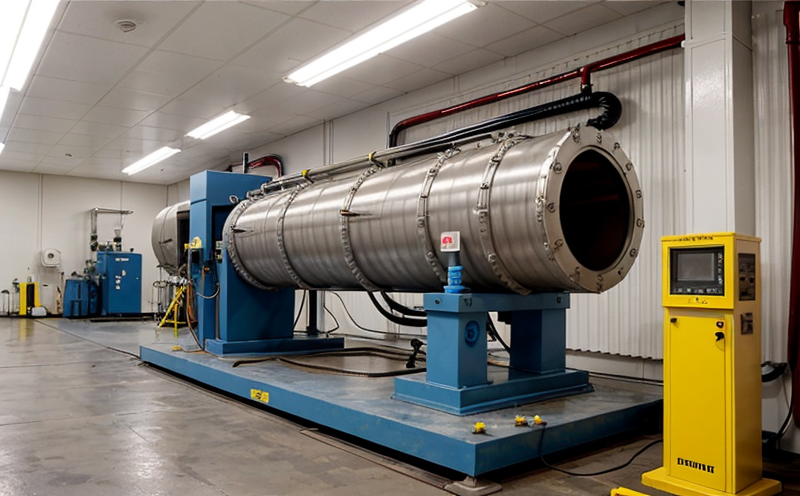ASTM C967 Determination of Plutonium Isotopes in Nuclear Fuel
The determination of plutonium isotopes is critical for ensuring the safety, efficiency, and compliance with regulatory standards in nuclear fuel processing. ASTM C967 provides a standardized method to accurately measure the concentration levels of plutonium isotopes such as Pu-238, Pu-240, and Pu-241 within nuclear fuels.
This testing is essential for several reasons:
- To ensure compliance with international regulatory standards like IAEA (International Atomic Energy Agency) guidelines.
- To optimize fuel performance by understanding the isotopic composition which affects reactivity.
- To enhance safety measures in handling and storage of nuclear materials.
The ASTM C967 procedure involves several steps:
- Sample Collection: Carefully collected samples from nuclear fuel batches are prepared for analysis. The sample preparation includes drying, crushing, and sieving the material to achieve a uniform particle size suitable for analysis.
- Solution Preparation: The prepared sample is then dissolved in nitric acid under controlled conditions to create an acidic solution that facilitates the plutonium isotopes extraction process.
- Cleanup Steps: To minimize interference from other elements present, a series of purification steps are performed using solvent extraction or ion exchange methods. This ensures minimal contamination and accurate measurement.
- Analytical Determination: The cleaned solution is then subjected to alpha spectrometry for quantification. Alpha spectrometry involves detecting the characteristic alpha particle emissions from each plutonium isotope, which are unique to their respective isotopes.
The method requires precise handling and calibration to ensure accurate results. This process ensures that the data obtained is reliable and can be used by regulatory bodies and nuclear facilities for decision-making processes.
Our laboratory adheres strictly to ASTM C967, providing consistent and repeatable test results. Our team of experts uses state-of-the-art equipment and follows stringent protocols to ensure accurate determination of plutonium isotopes in nuclear fuels.
Scope and Methodology
The scope of ASTM C967 is focused on the precise quantification of plutonium isotopes within nuclear fuel materials. This method ensures that the isotopic composition meets specific standards set by regulatory bodies such as IAEA.
The methodology includes:
- Sample collection and preparation following strict protocols to ensure no contamination.
- Solution preparation using nitric acid, ensuring a clean extraction of plutonium isotopes.
- Purification steps to eliminate interference from other elements, enhancing the accuracy of the test results.
- Analytical determination through alpha spectrometry, which is sensitive enough to detect minute traces of each plutonium isotope.
The ASTM C967 procedure allows for accurate quantification and identification of isotopes, ensuring that nuclear fuel meets stringent quality control standards. This testing is crucial in maintaining safety and efficiency in the nuclear industry.
Eurolab Advantages
At Eurolab, we pride ourselves on delivering top-tier services for ASTM C967 plutonium isotopes testing:
- Expertise and Experience: Our team of highly skilled professionals specializes in nuclear fuel analysis.
- State-of-the-Art Equipment: We utilize advanced instruments that provide precise and reliable results.
- Comprehensive Quality Assurance: Every test undergoes rigorous quality checks to ensure accuracy.
- Regulatory Compliance: Our tests meet the highest standards set by regulatory bodies such as IAEA.
- Timely Delivery: We provide quick turnaround times without compromising on the quality of our work.
- Confidentiality: Your data and results are kept strictly confidential, ensuring your peace of mind.
Choose Eurolab for your ASTM C967 testing needs. We offer unparalleled expertise and reliability in nuclear fuel analysis.
Use Cases and Application Examples
The application of ASTM C967 is extensive, particularly in the nuclear industry:
- Nuclear Fuel Manufacturing: Ensuring that the isotopic composition of new fuel batches meets required standards.
- Fuel Cycle Optimization: Understanding how different isotopes influence reactor performance and efficiency.
- Safety Assessments: Identifying potential safety risks associated with specific isotopic compositions in nuclear fuels.
- Regulatory Compliance: Demonstrating adherence to international standards for nuclear fuel use.
Our testing can also aid R&D projects aimed at developing new, safer and more efficient types of nuclear fuel. By providing accurate data on plutonium isotopes, we support the advancement of technology in this critical field.





